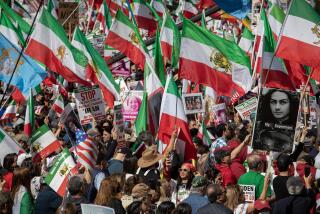Iranians protest at British Embassy
- Share via
TEHRAN — More than 150 students pelted the British Embassy here Sunday with firecrackers and a smoke grenade, demanding an apology and the closure of the mission following Iran’s detention of 15 British sailors and marines in the northern Persian Gulf.
Shouting slogans such as “Death to Britain” and carrying banners with a call to “finally wipe Israel from the face of the Earth,” hard-line Islamist students attempted to scale the embassy walls and pull down the flag but were rebuffed by riot police.
Hours later, two new purported confessions were broadcast on Iranian state television, which also aired previously unseen footage of two of the captured sailors admitting incursions into Iranian waters.
Dressed in military uniform and appearing healthy and relaxed, the two men stood in front of a large nautical map of the Persian Gulf, using a pointer to indicate locations. One smiled as he spoke.
The announcer said the pair had confessed to trespassing into Iranian waters about 10 a.m. March 23, half an hour before their small boats were surrounded by Iranian military personnel in gunboats south of the Shatt al Arab waterway.
British officials have questioned the conditions under which the apparent confessions have been made and have protested the airing of such footage, contending that it violates international conventions for the treatment of prisoners.
“It is completely unacceptable for these pictures to be shown on television, given the potential to cause distress to their families,” the Foreign Office said in a statement Sunday.
The embassy protest came as British and Iranian officials continued behind-the-scenes diplomatic contacts aimed at defusing the standoff.
Iran was said to be studying a British diplomatic note sent in response to its own, which reportedly has suggested that Britain provide a guarantee that it will not commit any future incursions into Iranian waters. Britain has refused to apologize, saying its service members were operating in Iraqi waters.
Although British Foreign Secretary Margaret Beckett on Saturday went so far as to say she regretted the situation, a Foreign Office spokesman insisted it was “not at all” an apology.
“She did say that it is a regrettable situation. Which it is. That doesn’t mean our position has changed; it’s very firm indeed,” the spokesman said, speaking on condition of anonymity. “She reiterated our previously stated position of calling for the group’s immediate return.”
Defense Secretary Des Browne said British and Iranian officials were continuing bilateral contacts in the hope of ending the crisis quickly.
“We are anxious that this matter be resolved as quickly as possible, and we are bending every single effort to do that,” he told the BBC on Sunday. “We are in direct bilateral communications with the Iranians, and they know that not only do we have a very clear position, but we have the support of almost the entire international community.”
But Iran’s Foreign Ministry spokesman, Mohammed Ali Hosseini, said his country had “defended its sovereignty and territorial integrity” with the arrest of the 15 Britons and that a European Union statement Friday criticizing their detention was unnecessary.
“I regret to say that the European Union has supported the violation of international law by Britain,” Hosseini told state television. He said such bilateral issues could be resolved “easily
In a speech Sunday, Iranian President Mahmoud Ahmadinejad did not refer directly to the British detainees but predicted that “arrogant powers” would vanish like “bubbles on water.”
Speaking in the southwestern city of Khorramshahr, Ahmadinejad also pledged that there would be additional developments in Iran’s controversial nuclear program.
“The Iranian nation will soon hear fresh news about our country’s nuclear transition,” the president said, according to the official Islamic Republic News Agency.
Britain has joined the U.S. and other Western nations in demanding that Iran stop enriching uranium, which can provide fuel for civilian power plants but also, if highly refined, be used to make nuclear weapons.
In Tehran, the protest at the embassy did not result in any injuries or damage, the British Foreign Office said.
Most of the protesters were university students and members of the Basij citizens volunteer paramilitary force that is a fixture at hard-line public demonstrations in Iran.
The megaphones, speeches and organized nature of the event suggested that it was officially sanctioned.
“If the British apologize, we will not insist on closing down the embassy,”said Maryam, a geography student who declined to give her last name.
“We are here to convey our protest to the world,” said Zahra, who is studying German at Tehran University and who declined to give her last name. “We just want to be heard and have our rights recognized.”
*
Special correspondent Mostaghim reported from Tehran and Times staff writer Murphy from London.
More to Read
Sign up for Essential California
The most important California stories and recommendations in your inbox every morning.
You may occasionally receive promotional content from the Los Angeles Times.










